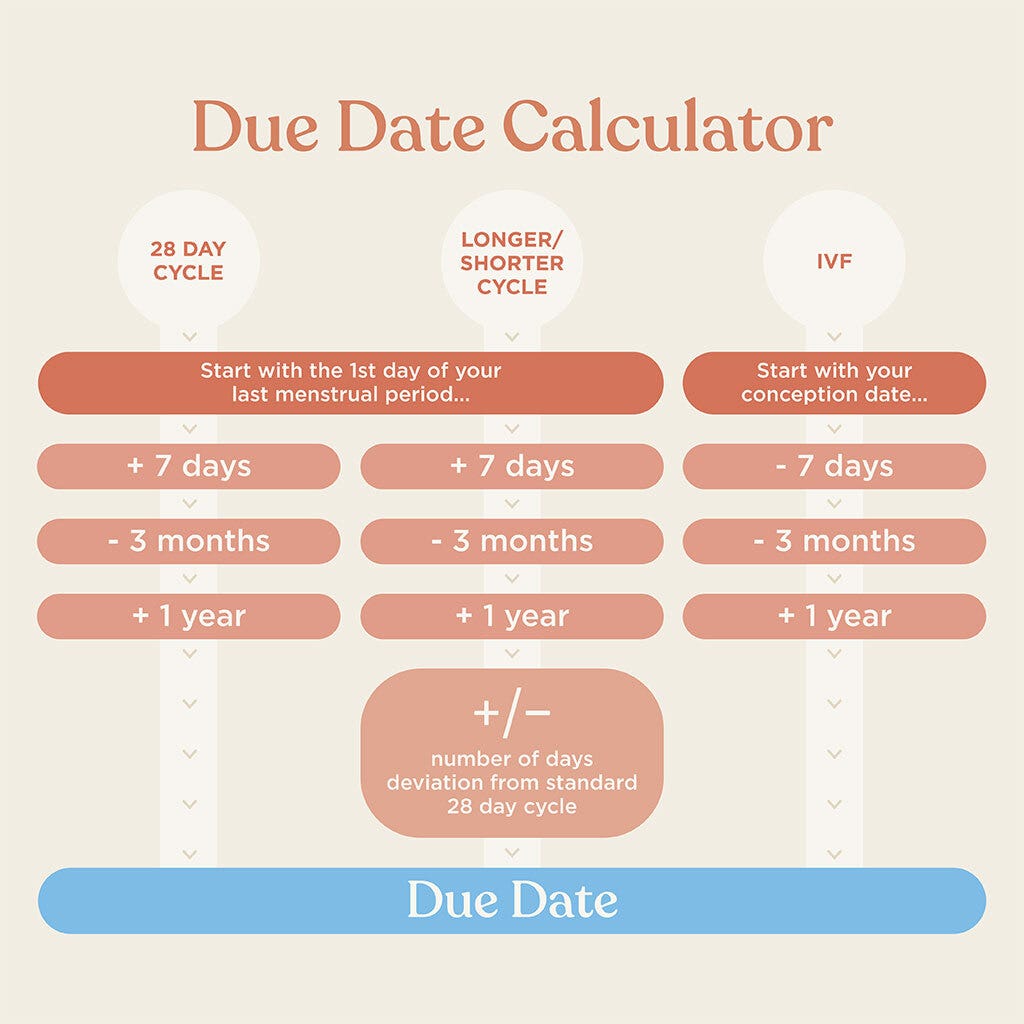
Congratulations, you're pregnant! At least that's what we're assuming since you're interested in how to correctly calculate a due date. Or, as they’re more officially known – an estimated date of delivery (EDD). As it is relatively unlikely that the estimated due date will actually be the date of birth, because most babies are born a few days or weeks earlier or later. There are various reasons - apart from pure curiosity - why it is important to know your baby’s due date. Our midwife Katrin Ritter will explain why this is the case and share a due date calculator for whether you’ve conceived naturally or via artificial means and whether you’re having one baby or multiple!
Calculating the due date
Only a few children (around 4-5 per cent) are born on their due date. It is therefore only a guide for you and your midwife / gynaecological practice. To calculate this, you need the exact time of conception. Do you know this? Then the pregnancy lasts an average of 266 days, 38 weeks or 9.5 lunar months of 28 days.
If you don't know the day of conception, the first day of your last menstrual period will help you. As you can generally get pregnant two weeks after the first day of your period at the earliest, you can expect 40 instead of 38 weeks of pregnancy.
However, if your baby is born significantly earlier, before the 37th week of pregnancy, this is referred to as a premature birth.
How do I calculate my pregnancy due date without a due date calculator?
The easiest way to calculate your due date is with a due date calculator. But, if you don't have a due date calculator to hand or you want to do it for yourself? Then how do you calculate your due date for pregnancy? Try the calculation from gynaecologist Franz Naegele. Take the first day of your last period and add a week. Then take this date and subtract 3 months from it. Now add another year et voilà, you have the calculated date of delivery. However, this only applies if you have a cycle with a standard length of 28 days. If your cycle deviates from this, you simply move the calculated date forwards or backwards by the difference.
IVF due date calculator
With artificial insemination, you have the great advantage of knowing the actual date of conception. That's why you don't use the first day of the last menstrual period for the calculation, but the actual time of conception.
Our calculator:

How accurate is the calculated due date?
Only around 4-5 per cent of babies are actually born on this date. This means that the majority of babies are born earlier or later, generally up to two weeks before or after. Even the more specific date given to you by your doctor is highly unlikely to be your baby's due date. The actual delivery date depends on many different factors, for example:
- How is your child developing?
- Are there any illnesses?
- How old is the mother at birth?
- Is this your first child or have you had children before? Were there any complications?
- Did you have artificial insemination?
- Is it a twin or multiple pregnancy?
Calculating the due date for twin or multiple pregnancies
Ideally, a multiple pregnancy runs just as smoothly as a singleton pregnancy. However, there are two or even more babies growing in your belly and things can get pretty tight. For this reason, multiples are often born between the 37th and 38th week of pregnancy or even earlier. To check the possible due date, simply use the due date calculator and then calculate a slightly earlier date for yourself if necessary. However, for official information from the authorities or similar, the regularly calculated delivery date or the date announced by your doctor/midwife always applies.
Calculating the due date - why learn it?
Now you may be asking yourself, if the actual due date is going to be a surprise after all, why should I calculate it? Good question. But you can probably already give yourself part of the answer: because you're curious. Or are you not? However, as mentioned above, there are a few other important reasons why you should have an official date:
- It puts your mind at ease
In addition to all the joy and expectations of pregnancies, there are always worries and fears. Quite a lot of emotions for expectant parents. Knowing roughly when your little one will see the light of day gives you a little more peace of mind and planning security.
- Avoid complications
In most cases, everything goes smoothly. But what if it doesn't? Antenatal care at the midwife's and/or doctor's practice means that both of you can keep a close eye on your health and intervene immediately if there are any abnormalities. The due date is also needed to assess the growth of your child or children.
- You can prepare yourselves better
The weeks and months of pregnancy fly by. Suddenly you are already in the 3rd trimester and may have lost sight of the fact that you still have a lot to prepare. For example, you need to prepare for the birth with the help of a birth preparation course. You should start this from around the 28th week of pregnancy so that you are ready at least four weeks before your due date.
- You must inform your employer.
In the UK, if you're entitled to paid maternity leave, you don’t have to tell your employer you're pregnant until the 15th week before your baby is due (when you are 25 weeks pregnant). You must tell them: you're pregnant. the date of the week your baby is due. The earliest you can start your maternity leave is 11 weeks before the expected week of childbirth. You can find out more here.
You due date might change - why is that?
Most people are probably aware that pregnancies with multiple babies, or complicated pregnancies can affect the due date. However, there are many other reasons why the actual due date may differ from the calculated due date.
Some of the reasons why a pregnancy might be shorter than usual:
- The due date was calculated incorrectly
Oops, how can that happen? Even if a due date calculator is very easy to use and the calculation method is very clear, mistakes can be made. Your midwife and/or your doctor will check during your antenatal care whether the calculated due date is still correct. This may be adjusted slightly during your pregnancy.
- Psychological factors play a role
Stress is poison for all of us - whether pregnant or not. But pregnant women in particular should try and avoid stress where possible. Because this also has an impact on your child's health. What's more, thanks to hormonal fluctuations, you are already super susceptible to emotional stress. And then worries about your child, your financial situation, your relationship etc. can quickly arise. A stressed body is then also more susceptible to infections of all kinds. These in turn can lead to complications during pregnancy and even to a premature birth. These instances are rare but take it easy! Your body is performing a small miracle and needs to be well cared for. Be kind to yourself.
- There is placental insufficiency
One of the most common causes of premature birth is placental insufficiency. This means that the placenta is only functioning slightly or not at all. the event of placental insufficiency, this can lead to the baby having to be delivered earlier.
- Premature labour has been triggered by bacteria
If your birth canal is infected by bacteria, this can trigger premature labour. This makes it highly likely that your baby will be born earlier.
- Alcohol, drugs or nicotine have been consumed
Alcohol, drugs and nicotine can severely damage your baby's development. Affected babies are usually born far too early, are seriously ill or even disabled. They also struggle with agonising withdrawal symptoms in the womb and after birth.
- The cervix is shortened
Premature birth also often occurs when the cervix is shortened. In this case, the cervix may open sooner and the baby may be born prematurely.
Some of the reasons why a pregnancy might be longer than usual:
- The date was calculated incorrectly
Again, if you or someone else makes a mistake or start from the wrong date in your cycle, this can of course affect your due date. Your midwife or gynaecological practice can adjust the date at any time if it becomes apparent during the pregnancy that something is wrong with the date.
- The egg has implanted late
The due date can also be pushed back slightly if you have entered the correct dates in your calculation, but the egg has simply taken a little longer than normal to implant in the uterus.
- All your babies are late
Incidentally, if you have already given birth to several children and they were all a little late, it is very likely that the next baby will also be born later.
Using a due date calculator - for the most beautiful of all joys
Early, late, or exactly on their due date - now you not only know how to use a due date calculator, but also why it simply can't be kept to in around 95% of cases. There are simply too many influencing factors and the calculated delivery date is always just a guideline. But it is important because you need it in many places. Be it for your midwife, your employer or just for you. No matter when it is we’re sure you’re looking forward to the big day when you hold your little miracle in your arms for the first time!
Source: Hipp.de



















